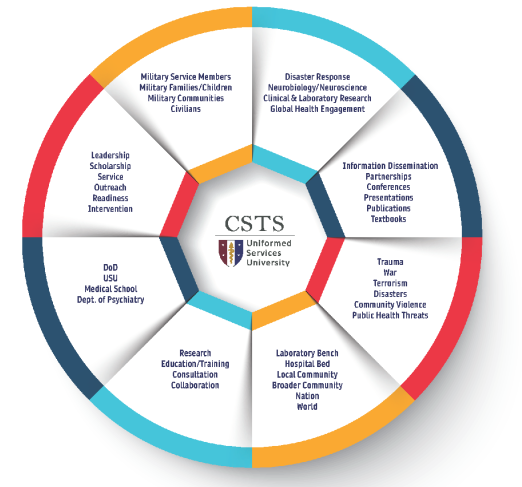Vision and Mission
VISION
The Center for the Study of Traumatic Stress will expand its international recognition as the Department of Defense's leader in expert knowledge, education, and research on traumatic stress, suicide and trauma-informed care, furthering the ability of DoD and the nation to respond to war, trauma and disaster and its effects on service members, units, families, and the nation's communities.
MISSION
The Center for the Study of Traumatic Stress (CSTS) is one of the nation’s oldest and most highly regarded, academic-based organizations dedicated to advancing trauma-informed knowledge, leadership and methodologies. The Center’s work addresses a wide scope of trauma exposure from the consequences of combat, operations other than war, terrorism, natural and humanmade disasters, and public health threats. CSTS is a part of our nation’s federal medical school, Uniformed Services University (USU), and its Department of Psychiatry. These affiliations represent the Center’s history, mission and future directions as a major contributor to our country’s understanding of the impact of trauma and the advancement of trauma-informed care.
A unique aspect and contribution of the Center is the bridging of military and disaster psychiatry and the integration of disaster mental health and public health. In applying the principles and practices for dealing with individuals and groups exposed to extreme environments (in the military), the Center has generated and disseminated its subject matter expertise to inform disaster preparedness, response and recovery principles and practices across a wide range of traumatic events and populations.
Today and into the future, the Center is uniquely positioned to respond to DoD mission relevant activities and issues, as well as to educate regional and national stakeholders in government, industry, healthcare, public health, and academia on mitigating the effects of disaster and trauma in the civilian community to foster human continuity and community and national resilience.
The Center:
- Develops and carries out research programs to extend our knowledge of the medical and psychiatric consequences of war, deployment, trauma, disaster and terrorism, including weapons of mass destruction.
- Educates and trains health care providers, leaders, individuals and public and private agencies on how to prevent, mitigate and respond to the negative consequences of war, deployment, traumatic events, disasters, and terrorism.
- Consults with private and government agencies on medical care of trauma victims, their families and communities, and their recovery following traumatic events, disasters and terrorism.
- Maintains an archive on medical literature related to the health consequences of traumatic events, disasters and terrorism of individuals, families, organizations, and communities.
- Provides opportunities for post-doctoral training of medical scientists to respond to and research the health consequences of trauma, disaster, and terrorism.







